- Home
- Colm Toibin
Mad, Bad, Dangerous to Know Page 2
Mad, Bad, Dangerous to Know Read online
Page 2
What is strange, as I move up this street in the scarce winter light, is how empty Westland Row might seem if you did not look properly, how ordinary and plain. Brick houses, the railway, one pub, a small supermarket, the Royal Irish Academy of Music, a church that is now too big and unwieldy, like a drafty old box, a few derelict buildings, even the buildings owned by Trinity College appearing sullen and withdrawn. Those images of Westland Row from the poems by Cronin and Kinsella could come to us as though created by mere lone voices, isolated sensibilities, solitary figures walking home or to work in a time that had remained what Maurice Craig called “an era of individuals,” a time when there was still, in Stanislaus Joyce’s words, “no national tradition,” when every writer had to invent a world as though from the very beginning.
Among these individuals who began to animate the city in the nineteenth century, as Maurice Craig points out, was the figure of Sir William Wilde, who, when he married Jane Elgee, lived first in this street. His son Oscar was born in 1854 at Number 21 Westland Row on the right-hand side as I move away from Pearse Street going south. There is a small plaque in Oscar’s honor on the building.
The Wildes moved around the corner to Number 1 Merrion Square soon after Oscar was born. Twenty years later, John Stanislaus Joyce moved his offices to Number 13 Westland Row. He and his mother may even have lived in this building, or in a nearby hotel. In their biography of Joyce’s father, John Wyse Jackson and Peter Costello wrote of Westland Row: “Though it is not usually seen as a Joycean district, this street seems to have retained its special significance for James Joyce.” Just as Joyce was to use Chapelizod, where his father first lived when he came from Cork to Dublin, in Finnegans Wake, there is, as Wyse Jackson and Costello made clear, an intensity in the way Westland Row is invoked in Ulysses, as though Joyce were evoking and exploring the spirit of his father’s early life in Dublin.
Westland Row appears in Episode 5 of Ulysses, or Leopold Bloom appears in the street in that episode. It is ten o’clock in the morning on June 16, 1904, as Bloom walks away from the quays via Lombard Street East, passing Nichols the undertakers, which is still in business to this day. He stops to look in the window of the Belfast and Oriental Tea Company at 6 Westland Row, now gone. Then he goes into the post office at 49–50 Westland Row, also disappeared. Using the name Henry Flower, he asks if there are any letters for him, to find that there is a letter from Martha Clifford, who has answered an advertisement he has placed in the Irish Times. (“Wanted smart lady typist to aid gentleman in literary work.”)
In Westland Row he bumps into an acquaintance called M’Coy, who has appeared earlier as “secretary to the City Coroner” in Joyce’s story “Grace.” M’Coy has been drinking in Conway’s at Numbers 31–32 Westland Row, now called Kennedy’s; they talk about the death of Paddy Dignam and the news that Molly Bloom is going to sing in Belfast. In passing, they mention the names of several other characters from the stories in Dubliners—Hoppy Holohan, Bob Doran and Bantam Lyons—thus thickening the plot. (M’Coy’s wife, who is a singer, also appears in Dubliners.) For a second, as he moves away, Bloom thinks about his father, who killed himself. Then he leaves Westland Row, moving to a smaller parallel street so that he can read the letter. Under the arch of the railway, having read the words of Martha Clifford, he tears up the letter.
He notes that “an incoming train clanked heavily above his head, coach after coach,” before he enters St. Andrew’s Church—which he calls All Hallows—by the back door, where he studies people receiving communion and makes one of the best jokes in the book when he considers the use of wine in the mass: “Wine. Makes it more aristocratic than for example if he drank what they are used to Guinness’s porter or some temperance beverage Wheatley’s Dublin hop bitters or Cantrell and Cochrane’s ginger ale (aromatic).”
Bloom, having mused further on the mysteries of religion, walks out the front door of the church, thus finding himself on Westland Row itself once more. He remembers that he must go to Sweny’s chemist at the top of the street, which up to recently was a normally functioning pharmacy but is now a sort of Joycean museum, where he has a lotion made up for Molly and where he buys a bar of lemon soap. In the shop, he is accosted by Bantam Lyons, who reminds him that the Ascot Gold Cup is being run that day. The race will be won by a horse called Throwaway, coming in at twenty to one. Since Bloom twice tells Lyons that he can keep his newspaper since he was going to “throw it away” in any case, Lyons presumes that this is a tip for Throwaway. Later in the novel it will be presumed that Bloom, who is unaware of the name of the horse, has won money on the race.
Bloom then walks from Westland Row into Lincoln Place, passing by the back gates of Trinity College, and moves into South Leinster Street, where he will visit the Turkish Baths. “Enjoy a bath now: clean trough of water, cool enamel, the gentle tepid stream. This is my body.”
Because the novel is set in 1904, Oscar Wilde and W. B. Yeats are already famous, as are Wilde’s parents. Thus James Joyce as he moves his characters in these streets is circling the world of the two other writers. In Episode 10, one of his characters will halt “at the corner of Wilde’s house” at 1 Merrion Square. Later, one of the nationalist songs written by Lady Wilde will be invoked.
Oscar Wilde himself is a constant presence in Ulysses. In Episode 1, for example, when they discuss the mirror, they refer directly to Wilde’s novel The Picture of Dorian Gray, published in 1891. In the same episode, Buck Mulligan says: “We have grown out of Wilde and paradoxes.” In Episode 3, there is a reference to “Wilde’s love that dare not speak its name” and to his poem “Requiescat,” written in memory of his younger sister. In Episode 9, as they discuss Shakespeare, there is a mention of “the Platonic dialogues Wilde wrote” and Wilde’s “Portrait of Mr. W. H.”
W. B. Yeats and his two sisters also wander through the pages of Joyce’s book as a source of considerable amusement to the author, it seems, and some of his characters. In Episode 1, Lily and Lollie Yeats appear as “the weird sisters” who print books in Dundrum, and they will be referred to later as “two designing females.” They had returned to Dublin a couple of years before Ulysses is set to establish the Dun Emer Press, which produced limited editions. (Wyse Jackson and Costello report an encounter between James Joyce and one of the Yeats sisters in 1903 or early 1904: “She noted his ‘tennis shoes’ and marvelled how the young man had told her that ‘he thought drink would soon end his father and then he would give his six little sisters to Archbishop Walsh to make nuns of.’ ”)
Ulysses also mocks W. B. Yeats himself. His statement on Lady Gregory’s translation of the Táin, “I think this book is the best that has come out of Ireland in my time,” is the cause of much mirth in the book. The novel also makes fun of the phrase “strangers in the house” from Yeats’s play Cathleen ni Houlihan. There is a parody of Yeats’s poem “Baile and Aillinn,” published the previous year. In his broadside “The Holy Office,” written before his departure from Dublin in 1904, Joyce also mocked Yeats.
Yeats’s grandparents and his father knew Oscar Wilde’s parents and were part of the same small Dublin world. It would be fascinating to imagine that Joyce’s father, when he moved into Westland Row with his mother, might have passed the Wildes on the street since their house was just around the corner, but he missed them by a few years. What connects Oscar Wilde with James Joyce, however, besides Wilde’s presence in Ulysses, is that both writers knew W. B. Yeats, who supported each of them in times of difficulty.
Yeats in his Autobiographies wrote an account of a Christmas dinner in the late 1880s that Wilde invited him to, believing him to be alone in London:
He had just renounced his velveteen, and even those cuffs turned backward over the sleeves, and had begun to dress very carefully in the fashion of the moment. He lived in a little house in Chelsea . . . I remember vaguely a white drawing-room with Whistler etchings, “let in” to white panels, and a dining room all white, chairs, walls, mantelpiece, car
pet, except for a diamond-shaped piece of red cloth in the middle of the table under a terra-cotta statuette, and I think a red-shaded lamp hanging from the ceiling to a little above the statuette . . . and I remember thinking that the perfect harmony of his life there, with his beautiful wife and his two young children, suggested some deliberate artistic composition . . . One form of success had gone: he was no more the lion of the season and he had not yet discovered his gift for writing comedy, yet I think I knew him at the happiest moment of his life.
On the day before Wilde’s trial began in May 1895, Yeats, who was almost thirty years old, called to Wilde’s mother’s house in London to express his solidarity with the author and deliver letters of sympathy that he had collected.
Twenty years later, when James Joyce was broke and wanted a pension from the British government, Yeats, who had known him first as an arrogant young writer in Dublin, wrote letters in his support, including one to Edmund Gosse, who had wondered, on behalf of the committee, if James Joyce actually supported the British cause in the First World War. Yeats loftily replied:
My dear Ghosse [sic]: I thank you very much for what you have done; but it never occurred to me that it was necessary to express sympathy “frank” or other wise with the “cause of the allies.” I should have thought myself waisting [sic] the time of the committee. I certainly wish them victory, & as I have never known Joyce to argue with his neighbours I feel that his residence in Austria has probably made his sympathy as frank as you could wish. I never asked him about it in any of the few notes I have sent him. He had never anything to do with Irish politics, extreme or otherwise, & I think disliked politics. He always seemed to me to have only literary & philosophic sympathies. To such men the Irish atmosphere brings isolation, not anti English feeling. He is probably trying at this moment to become absorbed in some piece of work till the evil hour is passed. I again thank you for what you have done for this man of genius.
As I walk past the Wildes’ house on Merrion Square, I note that W. B. Yeats lived on the square too in the years after his marriage and his brother had a studio on Fitzwilliam Square close by. In the National Gallery, also on Merrion Square, there is work by Yeats’s father and his brother Jack and also his two sisters.
Slowly, courtesy of the marriage between William Wilde and Jane Elgee in 1851 and the marriage between John B. Yeats and Susan Pollexfen in 1863 and the marriage between John Stanislaus Joyce and May Murray in 1880, a set of networks and webs of association began to evolve in the city, making it more mysterious, offering the atmosphere in Dublin a hidden and powerful undertow in the years before the 1916 Rebellion that politics did not offer, nor commerce either.
This newness in the city exalted the idea of isolation, individuality, aloneness. It remained an era of individuals, with writers and painters creating their moral worlds from chaos by themselves, for themselves. Leopold Bloom moves alone in the city, as Stephen Dedalus does. Wilde in his London world stood alone too, as he suffered alone. And Yeats stayed proudly aloof, as Joyce did in his exile. Ireland offered them isolation, as Yeats wrote to Gosse. It was a sort of gift.
Their fathers, too, stood apart, following no route that any community had charted. They lived as though there were no guidance, no map; there was only waywardness and will, hard frenetic work in the case of Sir William Wilde and wit and indolence in the case of John B. Yeats and John Stanislaus Joyce. They created chaos, all three of these fathers, while their sons made work. The sons became expert finishers—of plays, poems, novels, essays, and indeed their own fragile selves. In their own likeness, they made the world we walk in.
Just as Wilde would invoke his father in one passage of De Profundis and Joyce commemorate his father in his fiction, Yeats in a late poem called “Beautiful Lofty Things” remembered his father at the Abbey Theatre in the wake of the riots protesting against Synge’s The Playboy of the Western World:
My father upon the Abbey stage, before him a raging crowd:
“This Land of Saints,” and then as the applause died out,
“Of plaster Saints”; his beautiful mischievous head thrown back.
All three writers lived in a city that did not have a rich theatrical tradition or a great publishing industry—David Dickson notes that in 1871 “nearly all the fiction sold in Dublin, whatever its genre, was now produced in London.” They had fathers whose energy could be mined and used, just as they themselves offered an energy that any walker in the city can mine and use. They reimagined the ordinary, run-down streets, left traces and glowing clues that transform Westland Row and the streets around it as I walk back from the bank.
There is a beautiful essay that captures how much this matters by the poet Eavan Boland, who was a student at Trinity College in the 1960s. It is called “Becoming an Irish Poet.” It begins: “When I was a student I could choose which way to go home.” She could leave Trinity by the front gate or slip out into Clare Street and then go into Merrion Square:
Merrion Square is one of those old treasures of Georgian Dublin. An ambiguous gift of colony. On the nights I walked down to it, it was eerie and silent. But a century earlier it would have been different. The whole neighbourhood was then the centre of Dublin professional life. I could easily summon it as I stood there in the dark. Haloed gaslight. Fashionable carriages over the cobbles. The rush and noise of a ruling class.
Boland remembers a house on a corner: “One façade pointed at the trees of the square. Another looked towards Trinity. It was a tall structure, not quite rid—even in the present moment—of the hubris of its origins. But I was not looking up because of a bygone era. I was there for a previous tenant.”
That tenant was the poet and translator Jane Elgee, also known as Speranza, the wife of Sir William Wilde, the mother of Oscar Wilde. Boland seeks to imagine her “in the tumultuous decade of the 1840s . . . She was writing poetry and trying to have it published. She had not yet read her legendary son’s comment: ‘Others write the poetry that they dare not realize.’ For her, there would be no distance between poetry and self-realization.”
Boland muses on Speranza’s finding a nation through her poems and wonders about this, and also about the poems themselves, which she finds unconvincing. But that is not why she is standing here outside the Wildes’ house. She remains fascinated that the woman who wrote these poems was so certain of her loyalties:
On those cold nights, I still believed origin was simple and graspable. I was still convinced, after my own nomadic childhood, that coming to a cause and place which seemed to embody both was a rich source for a poet. And so when I looked up at Speranza’s window, it was not her failures I was imagining. It was her happiness.
The next paragraph begins: “It would take me years to see my mistake. To understand the difference between the place a poet claims and the place a poem renders.” Boland would in her own work not merely claim the suburbs of Dundrum, but allow her poems to render the interior life in the houses there so that the space took on an aura that was fully inhabited, courtesy of the poems’ cadences.
I am standing at the very place where Boland stood, looking at the plaque to Sir William Wilde, unveiled in 1971. The plaque reads: “Sir William Robert Wills Wilde, 1815–1876, aural and ophthalmic surgeon, archaeologist, ethnologist, antiquarian, biographer, statistician, naturalist, topographer, historian, folklorist, lived in this house from 1855 to 1876.” The unveiling, attended by the daughter-in-law of Oscar Wilde, with thirty to forty people present and speeches in Irish, attracted the attention of the Irish police, who moved in to note down the names of the speakers, believing that they had to be from some illegal organization. It took some time to convince the cops that the crowd was there merely to commemorate a great man and that those marking the occasion included the founder-director of the Irish Central Statistics Office, the president of the Royal College of Surgeons in Ireland, and a past president of the Royal Irish Academy.
Across the street, just within the railings of Merrion Square, there�
�s a funny, colorful statue of Oscar Wilde, the pose languid enough to attract the attention of even the most enlightened group of police.
To get to the memorials to W. B. Yeats and to James Joyce, two writers who spent their lives working on the differences and connections between the places they claimed and what the work they made rendered, I will have to walk along Clare Street, pass the Mont Clare Hotel, where my parents spent their honeymoon—my father, who had been a student in Dublin, my mother later complained, showed her too many churches—and cross over to where Greene’s Bookshop once was; there used to be a little post office at the back of it—and walk along South Leinster Street—Beckett and his father used to enjoy the same Turkish Baths as Leopold Bloom—again and turn into Kildare Street, where in Joyce’s story “Two Gallants,” not far from the porch of the Kildare Street Club, “a harpist stood in the roadway, playing to a little ring of listeners. He plucked at the wires heedlessly, glancing quickly from time to time at the face of each new-comer and from time to time, wearily also, at the sky.”
I walk past the National Library, where Yeats’s papers are, and some Joyce manuscripts. The library opened in 1890, having been built by the firm owned by Samuel Beckett’s grandfather. Yeats used the Reading Room, as did Joyce. Yeats, as Roy Foster wrote, later “remembered his youthful self sitting in the National Library in Kildare Street ‘looking with scorn at those bowed heads and busy eyes, or in futile revery listening to my own mind as if to the sounds in a sea shell . . . I was arrogant, indolent, excitable.’ ”
In December 1898, Yeats wrote to Lady Gregory from the library: “My only time of leisure is when I come here where I am now writing & go to a table away among the private passages of the National Library. The librarian lets me go & read where I like & so I escape drafts & noise.” Joyce would set Episode 9 of Ulysses in the library. This is where Stephen has his long debate about Hamlet and Shakespeare. In this building, “coffined thoughts around me, in mummycases, embalmed in spice of words.” At the end of the chapter Buck Mulligan will spot Leopold Bloom leaving the building and whisper to Stephen: “The wandering jew . . . Did you see his eye? He looked upon you to lust after you. I fear thee, ancient mariner. O, Kinch, thou art in peril. Get thee a breechpad.”

 The Magician
The Magician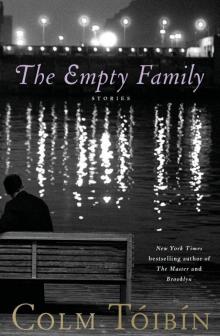 The Empty Family (v5)
The Empty Family (v5)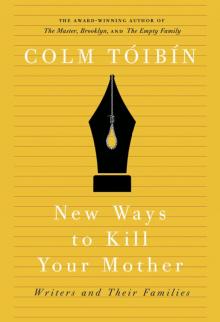 New Ways to Kill Your Mother
New Ways to Kill Your Mother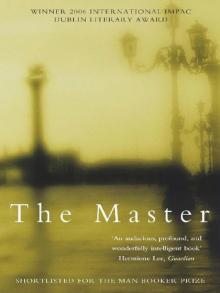 The Master
The Master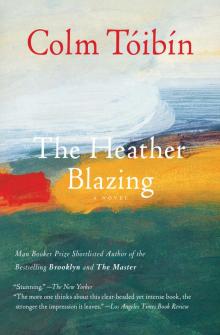 The Heather Blazing
The Heather Blazing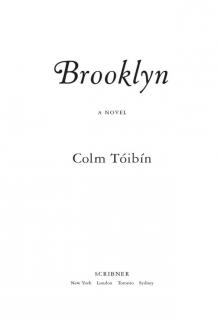 Brooklyn
Brooklyn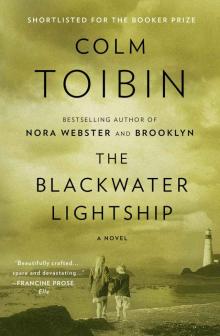 The Blackwater Lightship
The Blackwater Lightship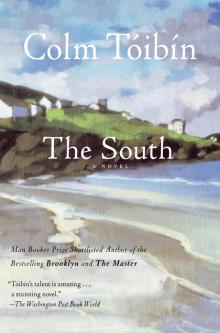 The South
The South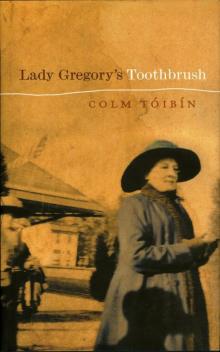 Lady Gregory's Toothbrush
Lady Gregory's Toothbrush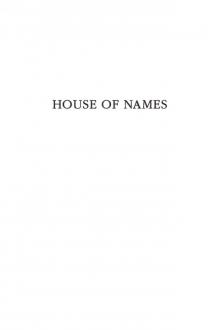 House of Names
House of Names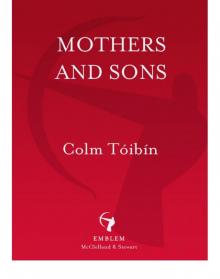 Mothers and Sons
Mothers and Sons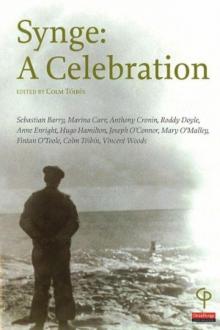 Synge
Synge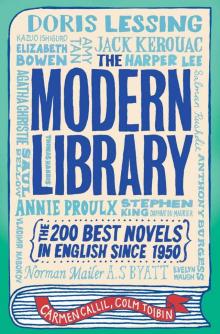 The Modern Library
The Modern Library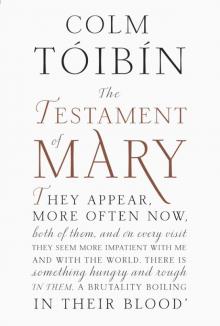 The Testament of Mary
The Testament of Mary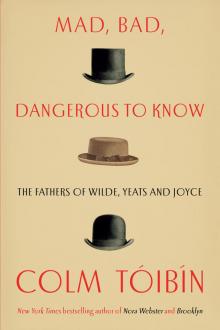 Mad, Bad, Dangerous to Know
Mad, Bad, Dangerous to Know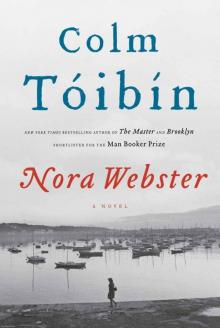 Nora Webster: A Novel
Nora Webster: A Novel